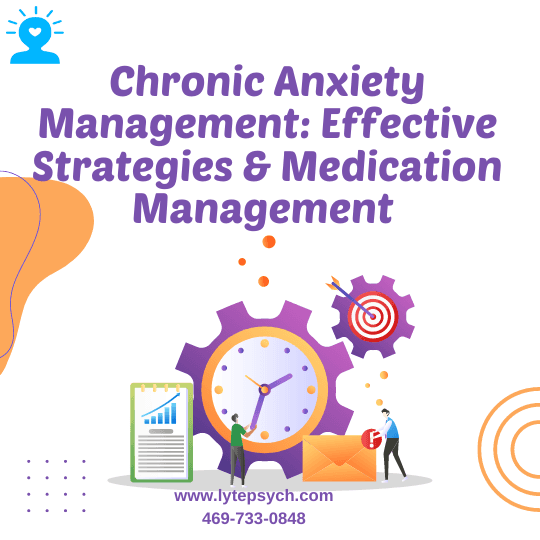Wed Jun 12 2024
Chronic Anxiety Management: Effective Strategies & Medication Management from Psychiatrists & Therapists at Lyte Psychiatry (Affordable Adults and Adolescents Therapist and Psychiatrist Near You) Best Therapist and Psychiatrist Near You Dallas, TX

Chronic Anxiety Management: Effective Strategies & Medication Management from Psychiatrists & Therapists at Lyte Psychiatry (Affordable Adults and Adolescents Therapist and Psychiatrist Near You)
Chronic anxiety can be a debilitating condition that affects every aspect of a person’s life. It goes beyond the occasional worry or nervousness, impacting daily activities, relationships, and overall well-being. At Lyte Psychiatry, our team of experienced psychiatrists and therapists specialize in helping individuals manage chronic anxiety through a combination of effective strategies and medication management.
Understanding Chronic Anxiety
What is Chronic Anxiety?
Chronic anxiety is a long-term condition characterized by persistent and excessive worry that is difficult to control. Unlike normal anxiety, which is a temporary response to stress, chronic anxiety persists over time and can interfere with daily functioning. It often requires professional intervention to manage effectively.
Symptoms of Chronic Anxiety
Symptoms of chronic anxiety can vary but often include:
Persistent worry or fear
Restlessness or feeling on edge
Fatigue
Difficulty concentrating
Irritability
Muscle tension
Sleep disturbances
Effective Strategies for Managing Chronic Anxiety
Cognitive Behavioral Therapy (CBT): Cognitive Behavioral Therapy is a highly effective treatment for chronic anxiety. It involves identifying and challenging negative thought patterns and behaviors. Through CBT, patients learn to develop healthier ways of thinking and coping with anxiety-provoking situations.
Mindfulness and Meditation: Mindfulness and meditation practices can help individuals stay grounded and present, reducing overall anxiety levels. Techniques such as deep breathing, progressive muscle relaxation, and guided imagery can be particularly beneficial.
Exercise and Physical Activity: Regular physical activity has been shown to reduce symptoms of anxiety. Exercise releases endorphins, which are natural mood enhancers, and helps to reduce stress levels.
Healthy Lifestyle Choices: Maintaining a healthy lifestyle can significantly impact anxiety levels. This includes:
Eating a balanced diet
Getting adequate sleep
Limiting caffeine and alcohol intake
Staying hydrated
Medication Management for Chronic Anxiety
Types of Medications
There are several types of medications that psychiatrists may prescribe for managing chronic anxiety, including:
Selective Serotonin Reuptake Inhibitors (SSRIs):
Serotonin-Norepinephrine Reuptake Inhibitors (SNRIs):
Medications such as venlafaxine and duloxetine can be effective in treating anxiety.
Benzodiazepines:
Buspirone:
This medication is specifically for treating anxiety and is less likely to cause dependence.
Working with a Psychiatrist to Help you Manage Chronic Anxiety
A psychiatrist at Lyte Psychiatry can help determine the most appropriate medication based on an individual’s specific symptoms and medical history. Regular follow-up appointments are crucial to monitor the effectiveness and adjust dosages as needed.
The Role of Psychiatrists and Therapists at Lyte Psychiatry
Comprehensive Assessment
The first step in managing chronic anxiety at Lyte Psychiatry is a comprehensive assessment. This involves a detailed evaluation of the patient's medical history, symptoms, and lifestyle factors.
Individualized Treatment Plans
Ongoing Support and Monitoring
Effective management of chronic anxiety requires ongoing support. At Lyte Psychiatry, we provide continuous monitoring and support to ensure that treatment remains effective and adjusts as needed.
Seeking Professional Help at Lyte Psychiatry (Best Adults and Adolescents Psychiatrist and Thaerapist Near You)
If you or someone you know is struggling with chronic anxiety, professional help is available. Lyte Psychiatry offers a range of services designed to help individuals manage anxiety effectively and improve their quality of life. Our team of experienced psychiatrists and therapists are dedicated to providing compassionate, evidence-based care.
To Schedule an appointment. Click Here
To see our services. Click Here
Call us if you have questions at 469-733-0848
FAQ
Q: What is the most effective treatment for chronic anxiety?
A: The most effective treatment for chronic anxiety often involves a combination of therapy (such as CBT), medication, and lifestyle changes. Working with a professional to tailor a treatment plan to your specific needs is crucial.
Q: Can chronic anxiety be cured?
A: While chronic anxiety may not be "cured" in the traditional sense, it can be effectively managed with the right treatment and support. Many individuals live full, productive lives with chronic anxiety.
Q: How long does it take for medication to work for chronic anxiety?
A: The time it takes for medication to work can vary. SSRIs and SNRIs, for example, may take several weeks to show full effects, while benzodiazepines can provide relief more quickly but are typically used short-term.
Q: What lifestyle changes can help with chronic anxiety?
A: Healthy lifestyle changes that can help manage chronic anxiety include regular exercise, a balanced diet, adequate sleep, and mindfulness practices. Reducing caffeine and alcohol intake is also beneficial.
Q: How often should I see my psychiatrist or therapist for chronic anxiety?
A: The frequency of visits can vary based on individual needs. Initially, more frequent visits may be necessary to monitor progress and make adjustments. Over time, visits may become less frequent as symptoms improve.